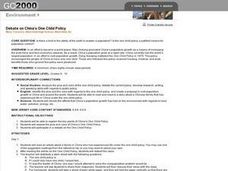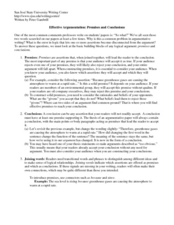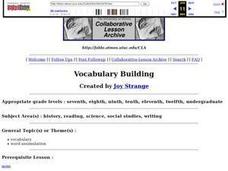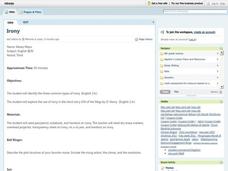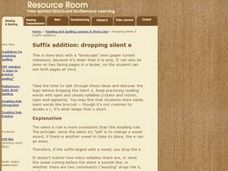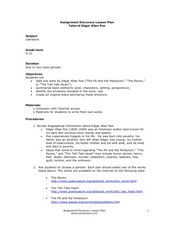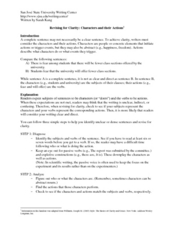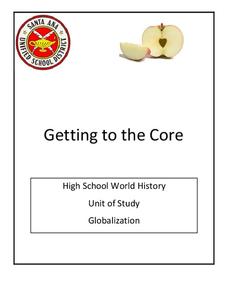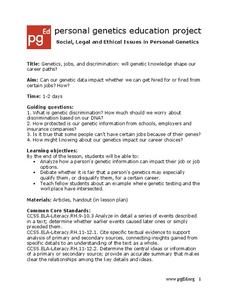Curated OER
Debate on China's One Child Policy
High schoolers learn about China's One Child Policy. They read an article about a specific family's experience under the policy (not included) and research and explain the key points of the policy. They assess the pros and cons in a...
San José State University
Effective Argumentation: Premises and Conclusions
Augment argumentative skills with this handout and brief exercise. This resource outlines premises, conclusions, and joining words, and explains how these make up the foundation of logical arguments. After reading through this...
Curated OER
Texas Kid Writes Book About Presidents
Arranged into small groups, learners read a paragraph of the news story "Texas Kid Writes Book About Presidents." As one reads, others mark the text (underlining important information and writing notes in the margin of the story). After...
Curated OER
Irony in Poetry and Prose (Fiction and Non-fiction Texts)
Middle and high schoolers examine the impact of irony in poetry and prose. In this figurative language lesson, they read instructor-selected literature and identify uses of irony. Then they discuss how irony enhances literature.
San José State University
Sentence Fragments
Work on sentence fragments with your class using this handout and brief exercise. This resource, which could be used as a reference sheet for learners, goes into detail about complete sentences and the different errors that cause...
Curated OER
Express Yourself Lesson Seed 9: Climax
Conduct a close reading of chapter 9 of The Cay. Read the chapter again and ask pupils to respond to a list of included text-dependent questions. Finish the class with the provided writing assignment, which asks learners to use textual...
Polk Bros Foundation
Meet the Nonfiction Main Idea Challenge
Help your class develop the ability to determine a main idea with a packet of materials that you can introduce and use over a period of time. The packet includes some information for the teacher and rationale for the exercises. There are...
Curated OER
Vocabulary Building - Declaration of Independence
Young scholars read the first part of the Declaration of Independence and mark the words they don't know. First, they try to guess what the words mean by looking at the them in context, and then they look up the words in a dictionary.
Curated OER
Irony
What are the three types of irony? High schoolers engage in a lesson about the use of irony while reading O.Henry's short story "Gift of the Magi." They'll discuss rising action, climax, and resolution in the text before highlighting the...
Curated OER
How Do I Write an Article Critique?
Your middle and high schoolers have written tons of summaries, but can they give a strong critique of an article they've read? Identify the differences between summary writing and critiquing. Choose an interesting article and have...
Curated OER
Narrative Nuts and Bolts
After viewing slides and reading about child labor, young authors compose an original narrative story. They practice note-taking skills and work to effectively engage a reader by incorporating plot, logical order, complex characters,...
Curated OER
Suffix Addition: Dropping Silent "e"
High schoolers engage in a lesson that is concerned with the concept of using the silent "e" in certain words. They practice using the rules while reading them in a review. The application of the rule is given in the lesson and can be...
Curated OER
Tales of Edgar Allen Poe
Analyze the writing of Edgar Allen Poe by reading and then writing in a similar style. Budding authors learn about the life of Poe and read one or more of his famous works online. Partner groups create an original piece of writing using...
Curated OER
Style and Voice
Develop the writing skills of your high school class. Writers consider their personal style and voice, read selections by other authors, and then write pieces that challenge them to experiment with their own style.
Curated OER
Introduction to Poetry Lesson Plan
Analyze poetry in a group setting. Middle and high schoolers read lyrics to a Tom Petty song and free write about the song's tone, setting, and speaker. They then complete the same activity in a group setting using seven poems. The...
Curated OER
Analyzing Nonfiction Text Elements - Editorials
Examine the text features of non-fiction. Start the lesson by reading editorial samples provided by their instructor and analyze the texts for word choice, details, and organization. An editorial example and graphic organizer are...
San José State University
Writing Concisely: Deleting or Replacing Unnecessary Information
Are you actually feeling really tired of reading wordy, redundant, long, lengthy sentences practically all the time over and over again? Introduce writers to this handout and exercise to teach to tighten up their prose! Provides two ways...
Curated OER
Two Sides, Same Coin: How Political Beliefs Influence Language Use
Learners read several magazine articles on the same topic written from different political perspectives, paying particular attention to the diction, syntax, and arguments presented in support the point of view expressed. They then select...
Curated OER
Modernism in Poetry, Painting, and Music
Are you teaching Modernism to your class? Connect different areas of artistic expression in the Modernist Era. Learners read T.S. Eliot, view art by Pablo Picasso, and listen to a Modernist musical composition. This final assignment is...
San José State University
Revising for Clarity: Characters and Their Actions
This handout offers a three-step process for revising sentences for clarity: diagnose, analyze, revise. After reading an example sentence revision with a detailed explanation, learners complete three sample sentences using the three-step...
Walt Disney Company
Elizabeth Started All the Trouble
Elizabeth Cady Stanton was a famous suffragette that paved the way for equal rights for women. Readers respond to before, during, and after reading questions based on her story. The resource is a great addition to a lesson plan during...
Santa Ana Unified School District
Getting to the Core: Globalization
How have advances in technology and communication changed our world? That is the questions that world history students contemplate as they examine a series of primary and secondary source materials
Laura Candler
In the Dog House
Teach your young pups some new tricks with this math facts activity. Using a deck of cards and the included game board, pairs of young mathematicians draw cards and attempt to make products that are larger than their partners' products...
Personal Genetics Education Project
Genetics, Jobs and Your Rights
Your class will read an overview of the Genetic Information Nondiscrimination Act, passed in 2008 and address the question of whether or not genetic information should be used to influence our career paths. In jigsaw style, they then are...


